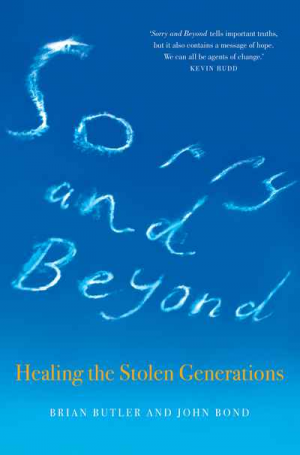Sorry and Beyond: Healing the Stolen Generations, is a collaboration between co-authors Brian Butler, a Stolen Generation survivor of Aranda and Luritja descent, and John Bond, an Initiatives of Change (IofC) worker with ties to Australia and the UK.
Sarah Naarden’s review tells us how the book’s accessible dialogue inspires us all to be agents of change in the unfinished work of Apology to the Stolen Generations.
Matching truth telling with truth hearing 
Brian Butler’s honesty confronts us from the first page of the book as he writes, ‘I am fortunate to live into my eighties; most Indigenous people die much younger. We die of despair.’ Not only was Brian’s mother part of the Stolen Generation, but his grandmother was also taken as a 12-year old girl in 1910.
Brian’s vulnerable and courageous truth telling is complemented by John’s meticulous approach to truth hearing and historical documentation. Together they capture insights tracing the arc of First Nations resistance to early colonization policies, to the mobilization of the community-led Sorry Day movement in the 1990s.
John Bond was awarded an Order of Australia Medal for his services on the Sorry Day Committee. In the book, he captures the anticipation that built towards that landmark day on 28 May 2000, when more than 250,000 people marched across Sydney Harbour Bridge to demand a government apology to Australia’s Stolen Generations. It was one of the largest demonstrations to ever take place in Australia, and became known as the ‘People’s Apology’.
Significance of the Apology
The spirit of solidarity and its healing effect is captured in an interview with Stolen Generations survivor Valerie Linow.
Valerie, a Bundjalung woman, was separated from her parents when she was two years old, and taken to the Cootamundra Domestic Training Home for Aboriginal Girls, NSW at the age of nine. Valerie was forced to work for a former police officer, who raped her when she was 15. She then ran away to Redfern and attempted suicide when she was 18.
During the time of the bridge march, Valarie was in her 50s and often plagued by the horrors she had experienced growing up. She saw no opportunity for healing in Australia. However, something profoundly shifted for her on the bridge.
She describes her feelings: ‘As I saw the thousands of people walking with us, a warm feeling came over me. I knew at last that I’m not alone. Then I looked up. “Sorry” appeared in the sky. Suddenly, tears began to pour down my cheeks. I even thought heaven opened its heart.’
John traces the rigorous advocacy process that took place over the next eight years for an apology to the Stolen Generation. In 2005, the Canadian government recognised the injustices inflicted on their First Nations People, compensating 10,000 Canadian dollars to each Residential School survivor. It was the largest settlement in Canadian history, costing the government 5.6 million Canadian dollars. International pressure began mounting on the Australian government, then led by John Howard, to follow suit—but with little action.
In 2007, widespread critique resurfaced, stemming from the Australian government’s failure to implement most of the recommendations in the 1997 Bringing Them Home report. One of the report’s suggestions was an apology, which then-Prime Minister Kevin Rudd made in 2008, four months after his government was voted in. His Apology speech marked a symbolic turning point in Australia’s reconciliation history.
The book illustrates the significance of the Apology through the response of Heather Kamarra Shearer, a Stolen Generation survivor who was adopted into a non-Aboriginal family in Adelaide. After decades of work at Aboriginal child care agencies, Heather finally met her own Aboriginal family at the age of 39.
‘Often I was the first person that a mother spoke to, regurgitating their trauma. I couldn’t put it in the file and walk away. It lived with me. The Apology took the onus of responsibility off my shoulders and gave it back to those who owned it.’
- Heather Kamarra Shearer, artist and Aboriginal child care worker
‘Sorry’ means you don’t do it again
According to SNAICC, a membership body for Aboriginal and Torres Strait Islander community-based organisations for child care, foster care, education and youth services, Aboriginal children are 11 times more likely to have out-of-home care then non-Aboriginal children, even in 2021.
The Aboriginal activist group, Grandmothers Against Removals, warn us that the current state of intervention policies are resulting in a second wave of Stolen Generations. Without First Nation community-led authority to oversee the care of children at risk, efforts to keep Aboriginal children in their extended families and cultural kinship groups have significantly decreased. The impact of this has been linked with the widening gap between Indigenous and non-Indigenous rates of youth incarceration, substance abuse and suicide.
In the closing chapters of the book, Brian uses the term ‘Lateral Violence’ to describe the disempowered victims, families and communities who give up on fighting for systemic change and instead turn on each other. He proposes the key antidote is to treat root causes through ‘Lateral Love’ that will propagate a spirit of unconditional care through First Nations’ ancient wisdom.
The book calls on us to practice deep listening that will enable us to walk together and discover each other in a respectful, reciprocal process. The effect, as it resonates, may enable us all to participate in a fuller expression of our nationhood, and of cultural abundance over scarcity.
The book is available for purchase from the AIATSIS shop.


